hemingway
- 格式:pdf
- 大小:309.10 KB
- 文档页数:15

汇报人:日期:•海明威生平•海明威作品•海明威的文学风格•海明威的影响与评价目•海明威的创作哲学•海明威与当代文学录海明威生平011899年出生在美国伊利诺伊州芝加哥市郊的橡树园镇。
1917年,他从高中毕业,进入堪萨斯市的《星报》当一名见习记者。
1918年,他辞去记者一职,并尝试加入美军,但因视力缺陷导致体检不及格,只被调到红十字会救伤队担任救护车司机。
早年生活1921年,在《星报》发表了第一首短篇小说《在密执安北部》。
1923年,他离开《星报》,再到《明星报》,与朵金丝·帕瑟共事。
1925年,在《大西洋彼岸评论》杂志上发表了短篇小说《在我们的时代里》大部分作品。
1926年,他离开《明星报》,到了加拿大的多伦多,在《多伦多星报》任记者。
1927年,他与哈德莉·理察逊结婚,移居佛罗里达州和古巴,过着宁静的田园生活。
1928年,他离开古巴去巴黎,与司各特·菲兹杰拉德相会。
1929年,发表了《永别了,武器》,这部长篇小说标志着他的思想和艺术进入了成熟阶段。
010203041940年,他与费雯·丽结婚;同年,因其作品具有理想主义和人道主义精神,在战时写了许多有关第三世界的正义言论;此期间作品创记录的达到多部。
1950年,他到非洲狩猎,这时他患上了肝炎和糖尿病;这期间他曾以侨民身份辗转于摩洛哥、西班牙和瑞士之间。
1961年7月2日,他在爱达荷州用猎枪结束了自己的生命,享年62岁。
晚年生活海明威作品02《乞力马扎罗的雪》《弗朗西斯·麦康伯短促的幸福生活》《一个干净明亮的地方》《世界之都》《春意》《雨里的猫》《白象似的群山》《杀人者》《医生追求富有的女人》《检举》《太阳照常升起》《永别了,武器》《丧钟为谁而鸣》《有钱人和没钱人》《过河入林》《伊甸园》02《曙光示真》03《午后之死》《海流中的岛屿》《非洲的狩猎》《危险的夏天》《海明威书信集》《海明威回忆录》《流动的圣节》散文及回忆录海明威的文学风格031 2 3避免使用冗余和修饰语直接、客观地描述现实强调简练、明了的表达方式简洁明快自然主义01强调对现实生活的准确描绘02关注社会底层人物和生活状态03揭示社会现实的阴暗面意识流通过描述人物意识流动的手法,展现人物复杂的情感和思想变化内心独白与意识流结合将两种手法相结合,更加深入地揭示人物内心世界内心独白通过角色内心独白的方式,展现人物的内心情感和思想变化内心独白与意识流海明威的影响与评价04海明威是20世纪美国最杰出的小说家之一,他凭借其独特的文学风格和深刻的社会洞察力,赢得了诺贝尔文学奖的荣誉。
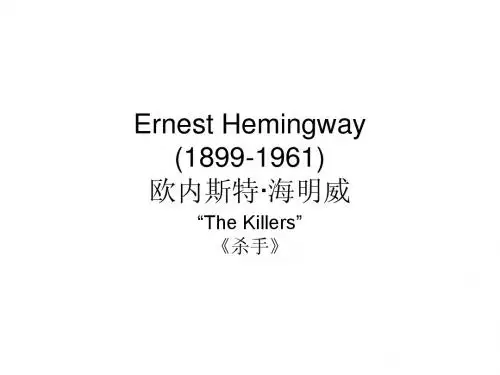
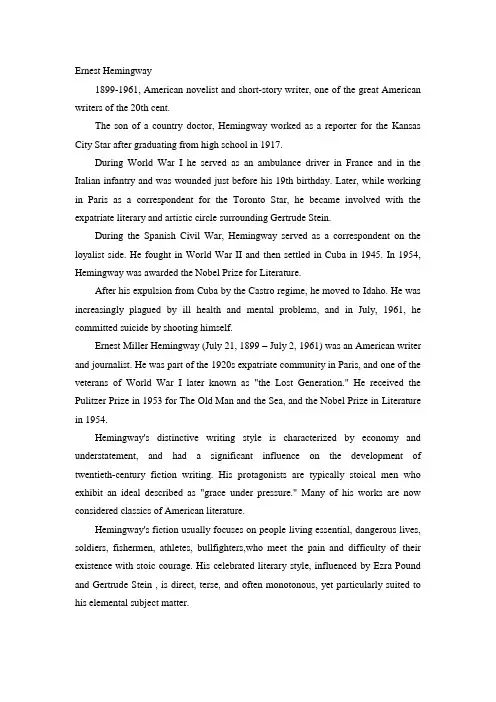
Ernest Hemingway1899-1961, American novelist and short-story writer, one of the great American writers of the 20th cent.The son of a country doctor, Hemingway worked as a reporter for the Kansas City Star after graduating from high school in 1917.During World War I he served as an ambulance driver in France and in the Italian infantry and was wounded just before his 19th birthday. Later, while working in Paris as a correspondent for the Toronto Star, he became involved with the expatriate literary and artistic circle surrounding Gertrude Stein.During the Spanish Civil War, Hemingway served as a correspondent on the loyalist side. He fought in World War II and then settled in Cuba in 1945. In 1954, Hemingway was awarded the Nobel Prize for Literature.After his expulsion from Cuba by the Castro regime, he moved to Idaho. He was increasingly plagued by ill health and mental problems, and in July, 1961, he committed suicide by shooting himself.Ernest Miller Hemingway (July 21, 1899 – July 2, 1961) was an American writer and journalist. He was part of the 1920s expatriate community in Paris, and one of the veterans of World War I later known as "the Lost Generation." He received the Pulitzer Prize in 1953 for The Old Man and the Sea, and the Nobel Prize in Literature in 1954.Hemingway's distinctive writing style is characterized by economy and understatement, and had a significant influence on the development of twentieth-century fiction writing. His protagonists are typically stoical men who exhibit an ideal described as "grace under pressure." Many of his works are now considered classics of American literature.Hemingway's fiction usually focuses on people living essential, dangerous lives, soldiers, fishermen, athletes, bullfighters,who meet the pain and difficulty of their existence with stoic courage. His celebrated literary style, influenced by Ezra Pound and Gertrude Stein , is direct, terse, and often monotonous, yet particularly suited to his elemental subject matter.Hemingway's first books, Three Stories and Ten Poems (1923), In Our Time (short stories, 1924), and The Torrents of Spring (a novel, 1926), attracted attention primarily because of his literary style. With the publication of The Sun Also Rises (1926), he was recognized as the spokesman of the “lost generation” (so called by Gertrude Stein). The novel concerns a group of psychologically bruised, disillusioned expatriates living in postwar Paris, who take psychic refuge in such immediate physical activities as eating, drinking, traveling, brawling, and lovemaking.His next important novel, A Farewell to Arms (1929), tells of a tragic wartime love affair between an ambulance driver and an English nurse. Hemingway also published such volumes of short stories as Men without Women (1927) and Winner Take Nothing (1933), as well as The Fifth Column, a play. His First Forty-nine Stories (1938) includes such famous short stories as “The Killers,” “The Undefeated,” and “The Snows of Kilimanjaro.” Hemingway's nonfiction works, Death in the Afternoon (1932), about bullfighting, and Green Hills of Africa (1935), about big-game hunting, glorify virility, bravery, and the virtue of a primal challenge to life.From his experience in the Spanish Civil War came Hemingway's great novel, For Whom the Bell Tolls (1940), which, in detailing an incident in the war, argues for human brotherhood. His novella The Old Man and the Sea (1952) celebrates the indomitable courage of an aged Cuban fisherman. Among Hemingway's other works are the novels To Have and Have Not (1937) and Across the River and into the Trees (1950); he also edited an anthology of stories, Men at War (1942). Posthumous publications include A Moveable Feast (1964), a memoir of Paris in the 1920s; the novels Islands in the Stream (1970) and True at First Light (1999), a safari saga begun in 1954 and edited by his son Patrick; and The Nick Adams Stories (1972), a collection that includes previously unpublished piecesErnest Hemingway (1899-1961), born in Oak Park, Illinois, started his career as a writer in a newspaper office in Kansas City at the age of seventeen. After the United States entered the First World War, he joined a volunteer ambulance unit in the Italian army. Serving at the front, he was wounded, was decorated by the Italian Government, and spent considerable time in hospitals. After his return to the United States, hebecame a reporter for Canadian and American newspapers and was soon sent back to Europe to cover such events as the Greek Revolution.During the twenties, Hemingway became a member of the group of expatriate Americans in Paris, which he described in his first important work, The Sun Also Rises (1926). Equally successful was A Farewell to Arms (1929), the study of an American ambulance officer's disillusionment in the war and his role as a deserter. Hemingway used his experiences as a reporter during the civil war in Spain as the background for his most ambitious novel, For Whom the Bell Tolls (1940). Among his later works, the most outstanding is the short novel, The Old Man and the Sea (1952), the story of an old fisherman's journey, his long and lonely struggle with a fish and the sea, and his victory in defeat.Hemingway - himself a great sportsman - liked to portray soldiers, hunters, bullfighters - tough, at times primitive people whose courage and honesty are set against the brutal ways of modern society, and who in this confrontation lose hope and faith. His straightforward prose, his spare dialogue, and his predilection for understatement are particularly effective in his short stories, some of which are collected in Men Without Women (1927) and The Fifth Column and the First Forty-Nine Stories (1938). Hemingway died in Idaho in 1961.。
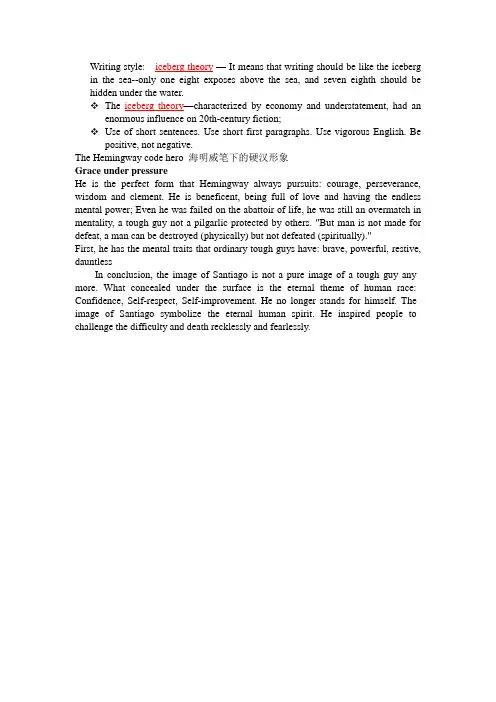
Writing style: iceberg theory — It means that writing should be like the iceberg in the sea--only one eight exposes above the sea, and seven eighth should be hidden under the water.The iceberg theory—characterized by economy and understatement, had an enormous influence on 20th-century fiction;Use of short sentences. Use short first paragraphs. Use vigorous English. Be positive, not negative.The Hemingway code hero 海明威笔下的硬汉形象Grace under pressureHe is the perfect form that Hemingway always pursuits: courage, perseverance, wisdom and clement. He is beneficent, being full of love and having the endless mental power; Even he was failed on the abattoir of life, he was still an overmatch in mentality, a tough guy not a pilgarlic protected by others. "But man is not made for defeat, a man can be destroyed (physically) but not defeated (spiritually)."First, he has the mental traits that ordinary tough guys have: brave, powerful, restive, dauntlessIn conclusion, the image of Santiago is not a pure image of a tough guy any more. What concealed under the surface is the eternal theme of human race: Confidence, Self-respect, Self-improvement. He no longer stands for himself. The image of Santiago symbolize the eternal human spirit. He inspired people to challenge the difficulty and death recklessly and fearlessly.。
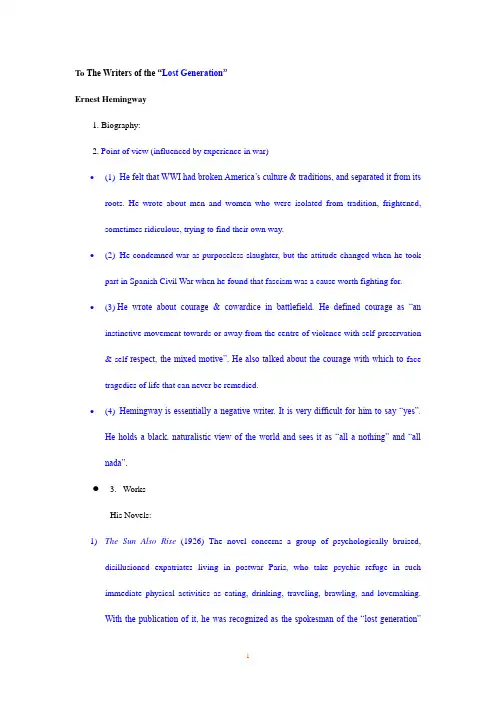
T o The Writers of the “Lost Generation”Ernest Hemingway1. Biography:2. Point of view (influenced by experience in war)•(1) He felt that WWI had broken America’s culture & traditions, and separated it from its roots. He wrote about men and women who were isolated from tradition, frightened, sometimes ridiculous, trying to find their own way.•(2) He condemned war as purposeless slaughter, but the attitude changed when he took part in Spanish Civil War when he found that fascism was a cause worth fighting for.•(3) He wrote about courage & cowardice in battlefield. He defined courage as ―an instinctive movement towards or away from the centre of violence with self-preservation & self-respect, the mixed motive‖. He also talked about the courage with which to face tragedies of life that can never be remedied.•(4) Hemingway is essentially a negative writer. It is very difficult for him to say ―yes‖.He holds a black, naturalistic view of the world and sees it as ―all a nothing‖ and ―all nada‖.3. WorksHis Novels:1)The Sun Also Rise(1926) The novel concerns a group of psychologically bruised,disillusioned expatriates living in postwar Paris, who take psychic refuge in such immediate physical activities as eating, drinking, traveling, brawling, and lovemaking.With the publication of it, he was recognized as the spokesman of the ―lost generation‖(so called by Gertrude Stein).2) A Farewell To Arms(1929) tells of a tragic wartime love affair between an ambulancedriver and an English nurse.3)Death in the Afternoon (1932), a nonfiction work about bullfighting4)Green Hills of Africa (1935), a nonfiction work about big-game hunting, glorify virility,bravery, and the virtue of a primal challenge to life.5)To Have And Have Not (1937)6)The Fifth Column (his only play 1938)7)For Whom The Bell Tolls (1940), in detailing an incident in the war, argues for humanbrotherhood.8)Across the River and into the Trees (1950)9)The Old Man And The Sea (1952, Pulitzer Prize), celebrates the indomitable courage of anaged Cuban fisherman Santiago.10)Paris: A Moveable Feast (1964)11)Islands in the Stream (1970)His Collections of Stories1)Three Stories and Ten Poems (1923),2)In Our Time (1924)3)Men without Women (1927)4)Winner Take Nothing (1933)5)First Forty-nine Stories (1938)His famous stories:1)The Killers2)The Undefeated3)The Snows of KilimanjaroHis masterpiece : The Old man and the Sea4. His Themes –―grace under pressure‖5. Hemingway’s Writing Style(1) simple and natural(2) direct, clear and fresh(3) lean and economical(4) simple, conversational, common found, fundamental words(5) simple sentences(6) Iceberg principle: understatement, implied things(7) SymbolismHemingway’s Iceberg TheoryThe dignity of movement of an iceberg is due to only one-eight of it being above water.His style has the kind of mechanism enabling reader to perceive more than what he says. Beneath the deceptively limited surface lies a complex and fully realized fictional world.the Hemingway (Code)hero(1) ―code (规范) hero‖Hemingway’s code is an ideal of personal courage, antagonism toward institutions and alienation from society and its values & traditions, an insistence on sanctity of the code of the individual. The Hemingway hero is an average man of decidedly masculine tastes, sensitive & intelligent, aman of action, and one of few words. That is an individualist keeping emotions under control, stoic & self-disciplined in a dreadful place. These people are spiritually strong, people of certain skills, and most of them encounter death many times.(2) All his code heroes demonstrate courage and perseverance in the face of adversity, although they are hindered by misfortune, they persist with dignity, thereby gaining a moral victory, this is what called ―grace under pressure‖The Sun Also RiseThe Sun Also Rise(1926) The novel concerns a group of psychologically bruised, disillusioned expatriates living in postwar Paris, who take psychic refuge in such immediate physical activities as eating, drinking, traveling, brawling, and lovemaking. With the publication of it, he was recognized as the spokesman of the ―lost generation‖ (so called by Gertrude Stein).The Sun Also Rises is about the disillusionment of the ―lost generation"—young British and American expatriates in France and Spain—in the aftermath of World War I. There is Lady Brett Ashley, who is waiting for her divorce to marry Michael Campbell; Jake Barnes, American correspondent, emascialated by a war injury, whom Brett loves but will not marry because she needs the physical relationship of marriage; Robert Cohn, American novelist and Frances Clyne, his mistress whom he no longer loves; and Pedro Romero, the bullfighter with whom Brett has a brief affair. These oddly assorted people, restless, dissolute, corrupt, are held together by their love for bullfighting, which appeals to them because they have lived so long with violence and because to them the ritual and precision of the sport is beauty. With economy of phrase Hemingway relates the obvious frustrations and the bitter, subtle pain ofthese representatives of the Lost Generation.Farewell to ArmsMajor themesLove as a response to the horrors of war and the world:Grace under pressure and the Hemingway hero:1.Theme:1.1.The Relationship between Love & Pain/war1.2. Grace under pressure and the Hemingway hero:2.Symbols:2.1Catherine’s hairE.g. a. Catherine takes down her hair and lets it cascade around Henry’s head: beingenclosed inside a tent or behind a waterfall, isolation from the world.b. in Switzerland, they learn that love, in the face of life’s cruel reality, is as fragile as hair.2.2Rain and destruction:the inevitable disintegration of happiness in life.E.g. a. Catherine admits that the rain scares her and says that it has a tendency to ruin thingsfor lovers.b. After Catherine’s death, Henry leaves the hospital and walks to the hotel in the rain.Its meaning: great love cannot last.Questions for ReferenceQuestion1:―code hero‖ in Hemingway’s four novelsMany other s consider Hemingway’s four novels to be among his best: The Sun Also Rises (1926), A Farewell to Arms (1929), For Whom the Bell Tolls (1940) and The Old Man and the Sea (1952). These four novels show us Hemingway’s life style of ―grace under pressure.‖ Ho wever, in different stages, his heroes, with Hemingway himself as the prototype, behave differently. In For Whom the Bell Tolls, Robert Jordan became very active and striving. He contributed his own life to the Spanish revolutionary cause. Finally, Hemingw ay’s another hero, Santiago, believed that man can be destroyed but cannot be defeated. He loved nature and life, and he became very rational. His endurance and survival are the victory. These heroes are what Hemingway was like in different stages. Heminway is the spokesman of the Lost Generation. However, he himself was not always lost throughout his life. His loss and perplexity in the 1920s was caused by the First World War, justlike the heroes Jake Barnes and Frederick henry. In the 1930s and the early 1940s, the world was affected severely by the Great Depression. Heminway began to strive and struggle in this troubled world and he began to care about the social issues. His enterprising spirit became different from his negativity and passivity in the 1920s. Moreover, as the growth of experience and understanding of the society, in the 1950s, Hemingway turned greatly rational. He could treat success, failure, life, death and the world correctly. He came to love life and nature. Therefore, it is only a one-sided point of view that Hemingway is a decadent man and Hemingway’s fiction is decadent literature.Ques tion2: Hemingway’s theme and writing style:①Works of Hemingway, portraying as they do the dilemma of modern man utterly thrownupon himself for survival in an indifferent world, reveal man's impotence and hisdespairing courage to assert himself against overwhelming odds. To Hemingway, man'sgreatest achievement is to show grace under pressure, or what he described in The SunAlso Rises as holding the "purity of line through the maximum of exposure." ―graceunder pressure‖ is a repeated theme in his novels. For him, in a world which is crazyand meaningless, there is nothing one can do but to take care of himself and be toughagainst fate and tough with grace under pressure.②His works have sometimes been read as an essentially negative commentary on a modernworld filled with sterility, failure, and death. Yet such a nihilistic vision is repeatedlymodified by Hemingway’s affirmative assertion of the possibility of living with style and courage. His primary concern was an individual's "moment of truth," and his fascinationwith the threat of physical, emotional, or psychic death is reflected in his lifelongpreoccupation with stories of war (A Farewell to Arms, 1929, and For Whom the BellTolls, 1940), the bullfight (Death in the Afternoon, 1932), and the hunt (The Green Hillsof Africa, 1935).。
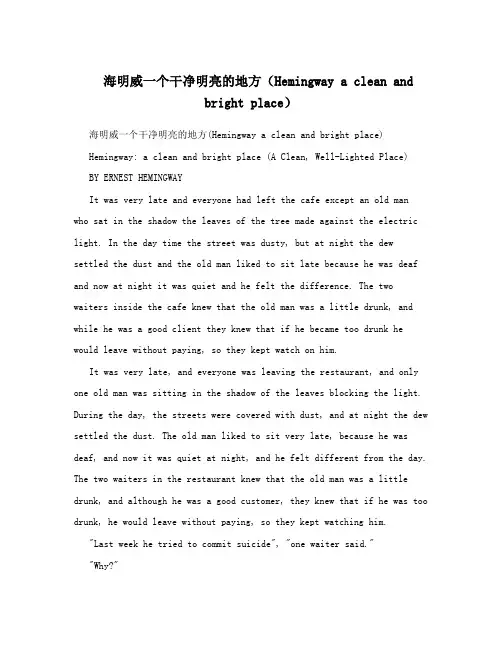
海明威一个干净明亮的地方(Hemingway a clean andbright place)海明威一个干净明亮的地方(Hemingway a clean and bright place)Hemingway: a clean and bright place (A Clean, Well-Lighted Place) BY ERNEST HEMINGWAYIt was very late and everyone had left the cafe except an old man who sat in the shadow the leaves of the tree made against the electric light. In the day time the street was dusty, but at night the dewsettled the dust and the old man liked to sit late because he was deaf and now at night it was quiet and he felt the difference. The two waiters inside the cafe knew that the old man was a little drunk, and while he was a good client they knew that if he became too drunk he would leave without paying, so they kept watch on him.It was very late, and everyone was leaving the restaurant, and only one old man was sitting in the shadow of the leaves blocking the light. During the day, the streets were covered with dust, and at night the dew settled the dust. The old man liked to sit very late, because he was deaf, and now it was quiet at night, and he felt different from the day. The two waiters in the restaurant knew that the old man was a little drunk, and although he was a good customer, they knew that if he was too drunk, he would leave without paying, so they kept watching him."Last week he tried to commit suicide", "one waiter said.""Why?""He was in despair."""What about?"""Nothing."""How do you know it was nothing?"""He has plenty of money."""He wanted to commit suicide last week," said a waiter."Why?" ""He's desperate.". ""Why despair?" ""It's okay.". ""How do you know it's okay?" ""He has a lot of money. "They sat together at a table that was close against the wall nearthe door of the cafe and looked at the terrace where the tables were all empty except where the old man sat in the shadow of the leaves of the tree that moved slightly in the wind. A girl and a soldier went by in the street. The street light shone on the brass number on his collar. The girl wore no head covering and hurried beside him.They sat together at a restaurant close to the wall near the door of the table, looked at the terrace where the tables were all empty, only the old man sitting on the wind gently flowing in the shadow of the leaves. A girl and a soldier walked across the street. The lights in the brass number on his collar. The girl was walking beside him without a hat on."The guard will pick him up", "one waiter said.""What does it matter if he gets what he's after?"""He had better get off the street now. ago. The guard will get him. They went by five minutes""The old man sitting in the shadow rapped him. on his saucer with his glass. The younger waiter went over to"What do you want?""The old man looked at him. "Another brandy", "he said.""The guards will catch him," said a waiter.What does it matter if he gets what he's looking for? ""It's good for him to walk away from the street now. The guards will get him in trouble. They just passed through here five minutes ago. "The old man sitting in the shadow rapped on his saucer with glass.The younger waiter went up to him."What do you want?" "The old man looked at him. "Another brandy," he said."You'll be drunk", "the waiter said. The old man looked at him. went The waiter away.""You're going to get drunk," said the waiter. The old man looked at him. The waiter walked away."He'll stay all night", "he said to his colleague." I'm sleepy now.I never get into bed before three o'clock. He should have week. killed himself last""He's going to stay here all night," he said to his colleague. "I'm sleepy now. I never went to bed before three o'clock. He should have killed himself last week. "The waiter took the brandy bottle and another saucer from thecounter inside brandy. the cafe and marched out to the old man's table. He put down the saucer and poured the of glass fullThe waiter took the brandy bottle and another saucer from thecounter inside the cafe and marched out to the old man on the table. He put down the saucer and poured the glass full of brandy."You should have killed yourself last week he said to the," deafman. The old man motioned with his finger. A little more he said.The waiter, "poured on into the glass so that the brandy slopped overand ran down the stem into the top saucer of the pile." Thank you, "the old man said. The waiter took the bottle back inside the cafe. He sat down at the table with his colleague again."You should have killed yourself last week," he said to the deaf man. The old man flashed his fingers. "A little more," he said. The waiterand filled his glass of wine to spill out, down the first saucer steminto a saucer. "Thank you," the old man said. The waiter took the bottle back to the restaurant. He was sitting at the table with his colleague."He's drunk now", "he said.""He's drunk every night."""What did he want to kill himself for?"""How should I know."""How did he do it?"""He hung himself with a rope."""Who cut him down?"""He's drunk now," he said."He gets drunk every night. ""Why does he want to kill himself?" ""How do I know?". ""How did he kill himself last time?" ""He hanged himself with ropes. ""Who put him down?" ""His niece."""Why did they do it?"""Fear for his soul."""How much money has he got?" "He's got plenty."" "He must be eighty years old."""Anyway I should say he was eighty.""His niece. ""Why do you want to put him down?" ""Worry about his soul. ""How much money does he have?" ""He has a lot of money. ""He must be eighty years old. ""Anyway, I'm sure he's eighty years old. ""I wish he would go home. I never get to bed before three o'clock. What kind of hour is that go to to bed?"""I wish he would go home.". I never went to bed before three o'clock. What kind of sleeping time is that? ""He stays up because he likes it."""He doesn't sleep because he doesn't like sleeping. ""He's lonely. I'm not lonely. I have me. a wife waiting in bed for""He's lonely. I'm not alone.I have a wife waiting for me in bed. ""He had a wife once too."""He once had a wife.". ""A wife would be no good to him now."""It's not good for him to have a wife at the moment. ""You can't tell. He might be better with a wife."""You can't say that. He may have better wives. ""His niece looks after him. You said she cut him down."""His niece will take care of him. You said she put him down. ""I know." "I wouldn't want to be that old. old An man thing. is a nasty"""I know. "I don't want to live that old.". The old man unkempt. ""Not always. This old man is clean. He drinks without spilling. Even now, drunk. Look at him.""Not necessarily all of them. The old man is clean. He drank beer without spilling. Even though I'm drunk now. Look at him. ""I don't want to look at him. I work. wish he would go home. He hasno regard for those who must""I don't want to look at him. I want him to go home. He doesn't care about people who can't work. "The old man looked from his glass across the square, then over atthe waiters.The old man raised his head from his glass, looked at the square,and looked at the two waiters."Another brandy," he said, pointing to his glass. The waiter who wasin a came hurry over."Another brandy," he said, pointing to the cup. The anxious waiterran by."Finished," "he said", speaking with that omission of syntax stupid now. people employ when talking to drunken people or foreigners. "Nomore tonight. Close"""No," he said, regardless of the syntax. "Stupid men say that whenthey talk to drunks or foreigners.". "It's gone tonight.". Closing up. ""Another," "said the old man.""One more cup," said the old man."No. Finished." The waiter wiped the edge of the table with a towel and head. shook his"No, no," the waiter wiped the table with a towel and shook his head.The old man stood up slowly counted, the saucers, took a leathercoin purse from his pocket and paid for the drinks, leaving half apeseta tip. The waiter watched him go down the street, a very old man walking unsteadily but with dignity.The old man stood up, slowly counted the saucers, hit his pocket with a coin from the pocket and paid for the drinks account, leaving half a peseta tip for. The waiter watched him go down the street, and the old man walked, though not steady, but very handsome."Why didn't you let him stay and drink?" the unhurried waiter asked. They were putting up the shutters. "It is not half-past two."""Why don't you let him stay and drink?" "The worried waiter asked. They're pulling down the shutters now. "It's not half past two. ""I want to go home to bed."""I'm going home to bed.". ""What is an hour?"""What's an hour?" ""More to me than to him."""He doesn't matter. I care.". ""An hour is the same."""It's an hour anyway. ""You talk like an old man yourself."他可以买一瓶酒在家喝。
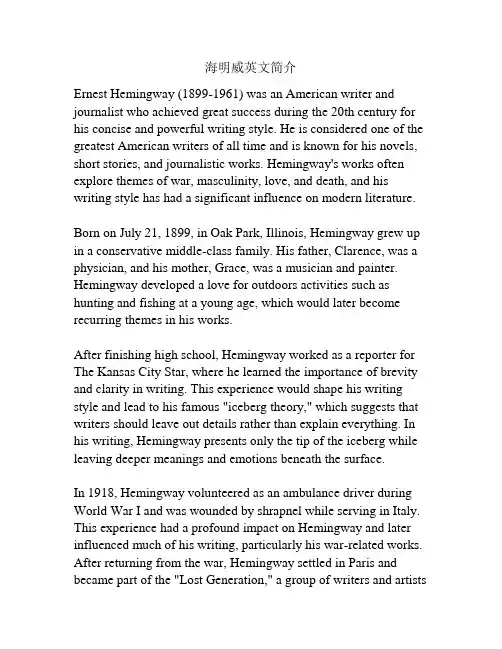
海明威英文简介Ernest Hemingway (1899-1961) was an American writer and journalist who achieved great success during the 20th century for his concise and powerful writing style. He is considered one of the greatest American writers of all time and is known for his novels, short stories, and journalistic works. Hemingway's works often explore themes of war, masculinity, love, and death, and his writing style has had a significant influence on modern literature.Born on July 21, 1899, in Oak Park, Illinois, Hemingway grew up in a conservative middle-class family. His father, Clarence, was a physician, and his mother, Grace, was a musician and painter. Hemingway developed a love for outdoors activities such as hunting and fishing at a young age, which would later become recurring themes in his works.After finishing high school, Hemingway worked as a reporter for The Kansas City Star, where he learned the importance of brevity and clarity in writing. This experience would shape his writing style and lead to his famous "iceberg theory," which suggests that writers should leave out details rather than explain everything. In his writing, Hemingway presents only the tip of the iceberg while leaving deeper meanings and emotions beneath the surface.In 1918, Hemingway volunteered as an ambulance driver during World War I and was wounded by shrapnel while serving in Italy. This experience had a profound impact on Hemingway and later influenced much of his writing, particularly his war-related works. After returning from the war, Hemingway settled in Paris and became part of the "Lost Generation," a group of writers and artistswho were disillusioned by the post-war world.During his time in Europe, Hemingway worked as a foreign correspondent for the Toronto Star, covering events such as the Greco-Turkish War and the Spanish Civil War. His experiences as a war correspondent provided material for his novel "A Farewell to Arms" (1929), which is widely regarded as one of Hemingway's greatest works. The novel tells the story of an American ambulance driver in Italy and his love affair with a British nurse during World War I. It explores themes of love, war, mortality, and the human condition.Hemingway's writing style is characterized by short sentences, simple language, and a focus on actions and dialogues rather than internal monologue. His writing is often described as "masculine" and reflects his interests in masculinity, courage, and stoicism. Hemingway's characters, such as the stoic fisherman Santiago in "The Old Man and the Sea" (1952), often face challenges with courage and grace.Hemingway received the Pulitzer Prize for Fiction in 1953 for his novel "The Old Man and the Sea," which tells the story of an aging fisherman's struggle to catch a giant marlin. The novel explores themes of perseverance, endurance, and the nature of a man's existence. Hemingway considered this novel to be his best work and it contributed to him being awarded the Nobel Prize in Literature in 1954 for his "powerful, style-forming mastery of the art of modern narration."Apart from his novels, Hemingway was also a prolific writer ofshort stories. His collections of short stories, such as "In Our Time" (1925) and "Men Without Women" (1927), showcased his ability to capture moments of human experience in a concise and powerful manner. Many of his short stories are set in exotic locations, such as Africa, Spain, and Cuba, and they often revolve around themes of masculinity, love, and death.In addition to his fiction works, Hemingway wrote extensively about his travels and adventures. His non-fiction works, such as "Death in the Afternoon" (1932) and "Green Hills of Africa" (1935), combine his love for travel, hunting, and writing. Hemingway's writing style, characterized by its authenticity and vivid depiction of landscapes and cultures, has had a lasting influence on travel writing.Tragically, Hemingway struggled with mental health issues throughout his life. He experienced several failed marriages and suffered from alcoholism. In 1961, at the age of 61, Hemingway took his own life in Ketchum, Idaho. Despite his personal struggles, Hemingway's literary legacy lives on, and his works continue to be studied and celebrated by readers and scholars around the world. Ernest Hemingway's concise and powerful writing style revolutionized modern literature. His works reflect his experiences as a war correspondent and his interests in hunting, fishing, and travel. Hemingway's writing explores themes of masculinity, love, and death, and his characters often face challenges with courage and stoicism. His novels, such as "A Farewell to Arms" and "The Old Man and the Sea," are considered classics, and his influence on literature is undeniable. Although he struggled with mentalhealth issues, Hemingway's literary legacy remains one of thefinest contributions to American literature.在过去几十年中,科技的发展以及全球经济的不断增长,给人们的生活带来了巨大的变化。
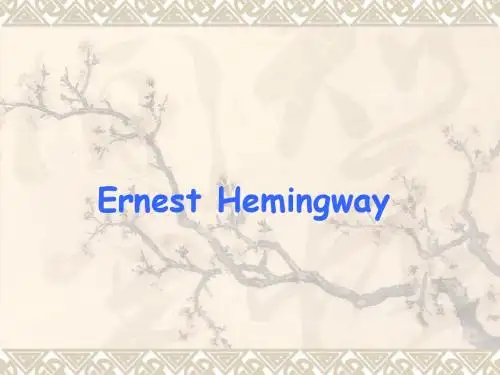
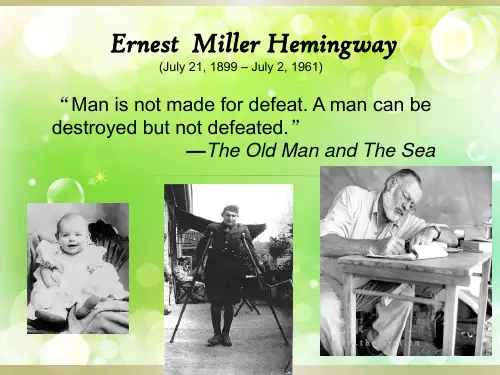
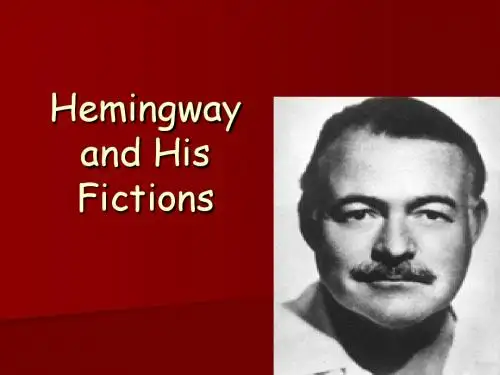
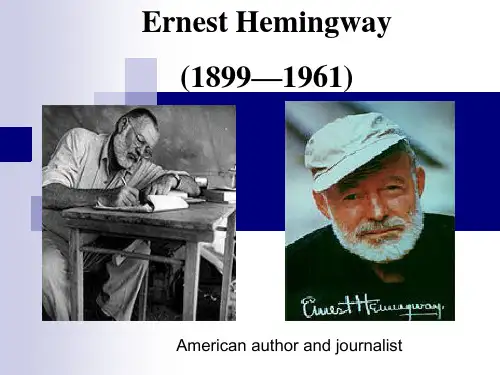
海明威英文简介Ernest Miller Hemingway July 21, 1899 - July 2, 1961, was born in the United States, Illinois, Chicago suburb of Oak Parker, American writer, journalist, is considered to be 20 One of the most famous novelists of the century.Hemingway* s life has won many awards・ He was awarded the bravery medal during the First World War; in 1953, he won the Pulitzer Prize for the book "The Old Man and the Sea" 1; the 1954 "Old Man and the Sea,z won Hemingway Bell Prize forLiterature・ In 2001, Hemingway,s "The Sun Also Rises" and ,?Farewell to Arms" were included in the 'Best English Novels of the 20th Century" by the American Modern Library・July 2, 1961, Hemingway in Idaho Ketchum's home with a shotgun committedsuicide・Hemingway1 s feelings in the complex, has concluded four marriages, is theUnited States "Lost Generation,z Lost Generation writers in the representative ofthe works of life, the world, society has shown a confused and anxious・ He has always been known as the literary tyk, he is the spirit of the American nation monument・ Hemingway* s work marks the formation of his unique creative style, inthe history of American literature and even the history of the world literature occupies an important position・language styleSimple big fish scene, the &uthor described as "the old man put down the fishing line, the harpoon held as high as possible, resorted to the strength of the body, plus he just Strength, put it straight down into the side of the fish・In these descriptions the author did not use any modified ingredients, but the verb, the noun is a simple combination to describe a thrilling scene・ In this plain language, people can feel the profound artistic realm and art at the end, this rustic language also makes Hemingway1 s works have more affinity and authenticity・Hemingway* s novel language has the characteristics of not redundant, simple style, simple sentence, simple words, he often use the basic word as the center to construct a single sentence, rarely use the expression of ideas adjectives and adverbs ・ In the twenty-sixth chapter of the "'Farewell to Arms, ” there was adialogue between Henry and the priest about the war ・ The dialogue was very concise, concise, without any glitzment, but from which the reader could feel the people Of disgust ・ In the novel "killer", the use of a lot of concise phrases, in the form of colloquial dialogue to start the plot, through the dialogue to avoid a lot of explanation and complex background account, giving an immersive feeling ・IntuitiveLiterature and art to express emotions, but the emotion is to rely on theappearance of things perspective, the more the appearance of things directlydescribed, the more able to produce a strong visual authenticity, the more able to narrow the distance between the reader and the writer. Hemingway with a high degree of visualization of the language, the visual, olfactory, auditory and other senses into the language, write the shape of things, color, etc ・, with direct visual performance of the universe and life ・ As in the snow of Kilimanjaro, Hemingwaywrote that the man was lying on the canvas bed, and he looked over the shy shade of the shy tree to the sun* s dazzling plain, with three huge birds hugging, and Many in the wings soar ・ Hemingway with this simple, simple language is to highlight the image of the clarity and visual sensitivity. The formation of this language style is closely related to th 亡 Impressionist Master Cezanne, who learned how to control the reader* s eyes from Cezanne, as in the early novel "In the North of Michigan'",Hemingway focused on the young girl, Cotz body, with her eyes describe the scene, in order to suggest its pure innocence, optimistic and naive, full of longing for the future ・The use of compound sentences and clauses is more in line with formal style,but the sentence is too long to make people look more strenuous, so Hemingway in the dialogue to strive to overcome this shortcoming, with simple, smooth, vivid sense of Hemingway has excellent language control ability. He often expresses the the concretemost complicated content in the simplest vocabulary. It expressesmeaning with the basic vocabulary, the simple sentence and so on.nouns and verbs to reveal the true face of things ・ From the point Hemingway often used a brief that there is no need to use long as thethings described decide ・ Such as the "old manof view, believes statement of language expression, he text modification carved to grandstanding, as clearly on the line, the other by the reader to and the sea ?,in the old man with a harpoon frogrhythm to express The movement of the characters, this text can often produce visual effects, to the reader to bring a visual impact・ Such as "the elderly and the sea v, the Marlins dragged the old man Santiago swim day and night, the elderly almost fainted, but still insist on not giving up, then the buthor with a very simple words "pull ah, hand Ah, he thought, stood firm, legs, "accurately expressed the fatigueof the elderly, resulting in a strong visual and psychological feelings・ In the short story "white elephant mountain" at the end of the author to take the troubleto repeat ''Please ask you, please, please, please, beg you, beg you, I beg you" The image expresses the girl* s upset and produces a strong visual impact・Implicit emotionHemingway has his own special artistic style, he emphasizes the objectivity of writing and the idea of the implicit implicit, against the author directly to the characters comment and implied, he often used implicit language to express complex emotions, with a limited form of expression of endless connotations , So his novels in the appearance of quietly, but the inner feelings are rich and hot ・''Iceberg principle'7 is Hemingway * s creative principle, he insisted that the complex social life should be extracted from the most characteristic of the plot, his thoughts and feelings hidden, in accordance with the '"iceberg principle" left seven seven feetof space Readers think and try to figure out・ Such as "'farewell, weapons, /z the outcome, Henry regardless of the nurse* s insidious to see his wife's remains, butto see his wife when the body did not have a statement, nor a tear, this silent farewell to do not explain and get explained, Alienated and cold and the realization of the purpose of care, to achieve "here silent victory" effect・ Hemingway often through the image of the characterization of the inner world of the charactershidden behind, through the performance of the material world to the reader to think, to imagine that this writing is a few pen, but it is into the wood, the characters* Portrayed, showing a do not yield to the fate of the tough guy spirit・Hemingway often struggles to get rid of the influence of subjective feelings on the work, with a near objective way to express their emotions, which is often demoted as "dumb cattle・"In fact, critics only flow in the works of appearance, do not understand the feelings of the author* s heart・ German writer Ryder has saidthat Hemingway through the indifferent to reach the excitement, without explanation to be explained・ In the z,white elephant mountains'" almost all dialogue, works almost do not see the trail of the author, but in the dialogue but there are deep connotation. In addition, Hemingway is very good at using language ambiguity to express symbolic and ideological content・ Such as ''farewell, weapons, " the weapons have two meanings, on the one hand the meaning of war, on the other hand isthe meaning of love, it symbolizes the two themes of the novel against war and farewell to love; Mountains "、” elephant "is not only the meaning of elephants, there are useless, cumbersome meaning・DialogueFrom the narrative approach, Hemingway,s novel* s dialogue is "show" ratherthan "tell"・ It is a kind of /?perfect imitation" that belongs to Plato, rather than the kind of "pure narrative'" that it wants to create a different degree of''imitation of the illusion" that is "the poet,s endeavor to cause him not to speak" But a person in the illusion of speech・ Compared to the two, ,z pure narrative'' narrative and event distance, as "pure imitation" directly. The dialogue gives the narrator complete the character, which pushes the imitation of the utterance to the extreme, completely obliterating the traces of the narrative, giving the words tothe characters and occupying the front desk・ In this case, the shadow of the author subsided, as if there were only people in the story, without the narrator, the story of the person, in other words, the narrator did not intervene or seldom intervene in the narrative, Under the traces of. This narrative approach, in terms of itsdistance from the object being described, is very close, almost equal to zero; it is subtie in terms of the narrative information it conveys・ Hemingway use thenarrative means of dialogue, its intention is "show", the pursuit of perfect imitation. In the "Kilimanjaro snow", in order to highlight the dialogue, theopening is the dialogue, very unexpected, this is the display of the narrative style ・In order to meet the concise expression of this expression, his dialogue as much as possible to write a very good understanding, not esoteric words, without big words, and small words, as long as the reader in accordance with the order to read down, fully understand the words of each speaker is Who. In addition, eachparticipant in the dialogue is generally two, one question and answer, or chat, or controversy・ The reason why the two people to maintain this measure, rather than a number of people, because many people, in the absence of the name of the speaker in the case of the reader is not easy to find out which one, which is very important・When there is a third person or more conversation, Hemingway must indicate the name of the speaker・Hemingway also wrote "style of spoken", his dialogue sentence is short, simple structure, there is no gorgeous rhetoric・ This style of spoken language is characterized by the use of the American Midwest people* s spoken language and its rhythm, but also mixed with different local language, the language of the ancientHavana, the Spanish language of the Guadalrama, Spanish English; The language of the fisherman, the language of the bullfighter, the language of the hunter, etc., read the sound of the sound, often to the reader a real language illusion・ They use the vocabulary, pronunciation methods are not the same・ We say that Hemingway,s novels are never fancy, and are used to avoid adverbs, adverbs and other modifiers・ Thisis reflected in many aspects. The dialogue is no exception・ We can also say that it is because of the large number of dialogues used in Hemingway* s novels・ Therefore, the large tracts of th亡daily language of the novel caused the overall simplicityof th亡nove1・ In modern narratology, the narrative means varied and varied・Hemingway's love of this unique narrative style, the reason is: the use of structuralism, "distance and angle"' theory to observe, the dialogue can make the reader feel immersive, and the narrative is difficuIt to achieve This realisticeffect・ In addition, the dialogue is more concise than the narrative, but also more vivid sense, implication is more abundant・ In view of the dialogue with such agreat superiority, the novel master Hemingway did not hesitate to adopt it, and its charm to an unparalleled degree, making his novel unique, dominate・Relationship between men and womenFrom the theme of the relationship between men and women to analyze Hemingway, it is easy to see, despite the keen to describe the man's wild and heroic, Hemingway has indirectly expressed his fear and hatred of women. His "code heroes codeheroes'7 are fighting alone, even if the woman has any relationship, and ultimately to be separated・ Strong sense of destiny and death in his works to be generally reflected・ Its masterpiece "old man and the sea/z is a sketch of a purely male world ・ DH Lawrence observed a pattern of men and women in Hemingway's short story: "A person wants to be free・" Just avoid one thing: get involved in it・ Never be involved・ If you are caught by something, get rid of it. Get rid of it and leave・For example, this is about Robert Jordan in the Spanish civil war toparticipate in a bombing bridge mission story, which interspersed with Jordan and Maria* s romantic love, they only have three days of romance, Jordan retreat Whenthe legs were seriously injured, and Maria can not go to Madrid.Three days in the mountains is the best of Jordan* s life, he and Maria* s love, although short, but to achieve the eternal, Jordan* s love in the revolution before the cause of the sacrifice・ He knew that he was still in danger and was dedicatedto the Spanish people・ However, from another point of view, this choice alsoreflects the cruelty of Hemingway. He did not know if Jordan and Maria jointly safe withdrawal is a sign that the beginning of a better life・ He would rather choose togloriously die, rather than romantic together for life・ In the ^farewell, weapons^, Henry did not start to Catherine seriously, and that is just a game・"It's better than going to the house every night, it's a game, just like playing a bridge, butit's not playing cards, but talking・"For example, when Catherine1s surgery wasHenry* s monologue, critics That Catherine's death and Henry* s hostility to her, in the last chapter, when Catherine1 s surgery, a short period of time, Henry 19thought Catherine will die, z/dead,z the recurrence of the word seems to be With the magic of the general anxiety, when Catherine on the operating table full of painful bleeding, Henry twice out to drink, but also eat something 一because he was hungry. When he came back, Catherine was dead・ And then in the "foreign land" in the "major" and "I" dialogue, for example, this story mentions that the young wife died of pneumonia:"Why should not men get married?''"No, that's it should not be done, " he said angrily. "Even if a man isdestined to lose everything, at least not to make himself fall to the point where he is to be lost, he should not let himself fall into that situation, and he shouldfind something that will not be lost・Major words, but also Hemingway's inner monologue・ Hemingway with his pen will be a woman in the novel one by one death, the hero is "tough guy", endured thespirit and physical pain・ In Hemingway* s novel, we can see this phenomenon, a good woman will eventually die or have passed away. As the "old man and the sea" only once mentioned the wife of Santiago is "the wall was once hanging his wife* s color, but he took it off, because he felt too lonely7' This is Hemingway ideal Love end: the old couple spent a lifetime of good times, good wife has passed away, widower fishing alone at the beach・After the above analysis, it can be concluded that in Hemingway's novels, th亡separation of men and women is usually based on a powerful external force 一in the form of extreme death・ In his first novel, Jack and Brett were separated fromJack's sexual incompetence, as in his three novels, "The Sun Also Raises",^Farewell, Weapons'" and "The Whip Bell" ; The second novel in the separation of male and female heroes died of Catherine dystocia; in the third novel, the hero Robert Jordan for the cause of justice and dedication・ Hemingway seems to use this so-called "fate" factor to cover up his fear of living with women.感谢您的阅读,祝您生活愉快。
hemingway 使用方法-回复Hemingway 使用方法:一步一步回答欢迎阅读本篇文章,其中我们将一步一步地回答有关使用Hemingway 编辑器的问题。
Hemingway 是一款以著名作家欧内斯特·海明威(Ernest Hemingway)命名的在线编辑器,它能够帮助你写出更加简洁、清晰和易读的文章。
该编辑器的独特之处在于它能够分析你的写作,并提供改进建议,使你的作品更具有影响力。
现在,让我们开始了解如何使用Hemingway 编辑器。
第一步:访问Hemingway 编辑器的官方网站要使用Hemingway 编辑器,首先你需要访问它的官方网站。
你可以在任何现代网络浏览器中搜索“Hemingway 编辑器”并打开官方网站链接。
一旦打开网站,你就可以看到一个界面简洁、易于使用的编辑器。
第二步:复制粘贴你的文章一旦你进入Hemingway 编辑器的页面,你将看到一个空白的编辑框。
你可以简单地复制你想要编辑的文章或段落,并将其粘贴到编辑器中。
根据你的需要,你也可以直接在编辑器中键入新的内容。
第三步:分析你的文章当你的文章加载到Hemingway 编辑器中后,它将自动进行分析。
这个分析过程包括检查文章中的各个方面,例如你的句子长度、段落结构、使用的修辞手法、不必要的副词或形容词等。
Hemingway 编辑器将这些方面标记为不同的颜色来提醒你需要注意的地方。
第四步:了解标记的含义Hemingway 编辑器使用不同的颜色和标记来表示你的文章中的不同问题。
以下是常见的标记及其含义:- 黄色:长而复杂的句子。
黄色标记表示你可能需要将句子分成更短的部分以提高可读性。
- 红色:过度复杂的句子。
红色标记表示你的句子可能难以理解,需要重新组织或简化。
- 紫色:使用了多余的修辞手法。
紫色标记表示你使用了过多的修辞手法,可能导致文章过于夸张或混乱。
- 蓝色:使用了弱化词语。
蓝色标记表示你使用了过多的副词或形容词,可以尝试去除或简化。
hemingway 使用方法Hemingway是一款文字写作编辑工具,以美国著名作家海明威的名字命名,旨在帮助用户提高文笔质量和写作效率。
它的主要功能是分析你的写作,并给出建议,使你的文章更加简洁、清晰和易于理解。
Hemingway的使用方法非常简单,只需要将你的文字粘贴或输入到编辑框中,它会自动分析并标注出需要改进的地方。
以下是Hemingway 的主要功能和使用方法:1.句子结构分析:在编辑框中输入文章后,Hemingway会分析文章中的每个句子,根据其复杂度进行标记。
难以理解的句子会用黄色标记,过长或过于复杂的句子则会用红色标记。
这有助于你调整句子结构,使之更加简明易懂。
2.单词选择和用法标记:Hemingway还会标记文章中使用的复杂词汇和用法。
它会提醒你是否可以用更简单、通俗的词汇来代替。
这有助于提高文章的可读性和易懂程度。
3.被动语态检测:Hemingway可以检测文章中使用的被动语态。
被动语态往往使句子更加笨拙和复杂。
通过将被动语态转换为主动语态,你可以使文章更加生动有趣。
4.分析读者理解难度:Hemingway会根据文章的复杂度和难度给出读者所需阅读水平的评估。
这有助于你判断你的受众群体,从而调整文章的语言和用词。
5.建议和改进建议:根据文本分析,Hemingway会给出相关的建议和改进建议。
它会提醒你摒弃废话、简化句子、避免重复和不必要的修饰等。
这些建议可以使你的文章更加简洁明了。
总之,Hemingway是一款非常实用的写作辅助工具,它不仅可以帮助你提高文章的可读性和易懂程度,还可以帮助你从读者的角度审视和改进自己的写作。
无论你是专业作家还是普通写作者,Hemingway都能为你提供宝贵的帮助和指导,提升你的写作水平。
Hemingway's "Out of Season": The Importance of Close Reading
Author(s): Charles J. Nolan, Jr.
Source: Rocky Mountain Review of Language and Literature, Vol. 53, No. 2 (1999), pp. 45-58
Your use of the JSTOR archive indicates your acceptance of JSTOR's Terms and Conditions of Use, available at .
/page/info/about/policies/terms.jsp. JSTOR's Terms and Conditions of Use provides, in part, that unless you have obtained prior permission, you may not download an entire issue of a journal or multiple copies of articles, and you may use content in the JSTOR archive only for your personal, non-commercial use.
Please contact the publisher regarding any further use of this work. Publisher contact information may be obtained at .
Each copy of any part of a JSTOR transmission must contain the same copyright notice that appears on the screen or printed page of such transmission.
JSTOR is a not-for-profit service that helps scholars, researchers, and students discover, use, and build upon a wide range of content in a trusted digital archive. We use information technology and tools to increase productivity and facilitate new forms of scholarship. For more information about JSTOR, please contact support@.
Rocky Mountain Modern Language Association is collaborating with JSTOR to digitize, preserve and extend
access to Rocky Mountain Review of Language and Literature.。